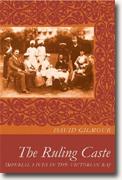The Ruling Caste
David Gilmour
book reviews:
· general fiction
· chick lit/romance
· sci-fi/fantasy
· graphic novels
· nonfiction
· audio books
· author interviews
· children's books @
curledupkids.com
· DVD reviews @
curledupdvd.com
newsletter
win books
buy online
links
home
for authors
& publishers
for reviewers

 |
The Ruling Caste: Imperial Lives in the Victorian Raj David Gilmour Farrar, Straus & Giroux Hardcover 416 pages February 2006 |
|
Political historian David Gilmour has written a thorough, studied and entertaining tribute to the men who gave their working lives to the service of Queen and country in the far-off and often inhospitable clime of India.
Though there were major drawbacks, a newly-arrived Lyall and his fellow “griffins,” as the greenhorns were known, could afford house servants, a horse and buggy, a groom and a game-keeper, the latter an essential since one of the few pastimes deemed proper and manly for the CSI was hunting. Tiger and wild boar were among the fitting prey, and when not hunting a civil servant might be playing polo, fiercely. The average day for such empire builders consisted of rising at dawn, going for a hearty ride, breakfasting sumptuously by a modern standard, then working from about seven until noon. At the height of the sun’s punishing rays “mad dogs and Englishmen” were on the prowl, the men obliged to make social rounds, visiting the formidable English memsahibs who diligently sought husbands for their newly arrived daughters. Sons and daughters of civil servants perpetuated the “ruling caste.” After the social hour, the men had naps until the cooler airs of evening came on, when they might hunt or ride again. Evenings were spent at the club, exclusive enclaves where the people they served served them, and more romantic intrigues were set in motion. The year had its rhythm, with the departure of the women to the hill country in the hottest season. There they had plenty of opportunity for adultery with the few men stationed there while their husbands slaved away in the blistering southern heat. It was a strained and enervating life that Kipling immortalized, and possibly some men went to India on the strength of Kipling’s lurid tales. Yet these men generally comforted themselves in the belief that they were doing good, taking up “the white man’s burden” and improving the lives of those they governed. After only a few generations, it was inevitable that the ICS would begin to turn on itself, with some of its members developing inordinate sympathies for the natives and others becoming hardened and cruel, perhaps frozen of spirit from having to live separately from both wife and children in the name of duty. The people they served also became ingrown into the system. Rajas were weakened by their uneasy alliance with the British, becoming spoiled, vicious and demanding. The common people grew tired of being dictated to, and Gandhi inevitably sprang up to take the high moral ground. The ICS brethren were a law unto themselves, isolated from the culture that spawned them and able to do as they pleased in all aspects of life. Returning home to a well-paid retirement, many degenerated into loneliness and dissolution, unable to cope with the stodgy strictures of the motherland. Sir Alfred Lyall sadly but wisely opined when he left the subcontinent that “in a month we shall be virtually forgotten.” But he did not disgrace himself by breaking down in retirement, and died quietly at “home.” Originally published on Curled Up With A Good Book at www.curledup.com. © Barbara Bamberger Scott, 2006 |
| Also by David Gilmour: |
|
|
|
 Click here to learn more about this month's sponsor! |
|
| fiction · sf/f · comic books · nonfiction · audio newsletter · free book contest · buy books online review index · links · · authors & publishers reviewers |
|
| site by ELBO Computing Resources, Inc. | |
 The book draws from diaries and other sources, often homing in on the career of Alfred Lyall, who eventually became Secretary of the Home Department of the British government in India, a job he loved: “he was delighted to exchange jungle work for an office with an armchair.” Lyall came to India fresh out of Haileybury, the college designed to train potential India hands. He could have chosen Cambridge, but a restlessness of spirit impelled him to foreign service. It should be noted that civil servants in India made good money, far better than their counterparts back home.
The book draws from diaries and other sources, often homing in on the career of Alfred Lyall, who eventually became Secretary of the Home Department of the British government in India, a job he loved: “he was delighted to exchange jungle work for an office with an armchair.” Lyall came to India fresh out of Haileybury, the college designed to train potential India hands. He could have chosen Cambridge, but a restlessness of spirit impelled him to foreign service. It should be noted that civil servants in India made good money, far better than their counterparts back home.